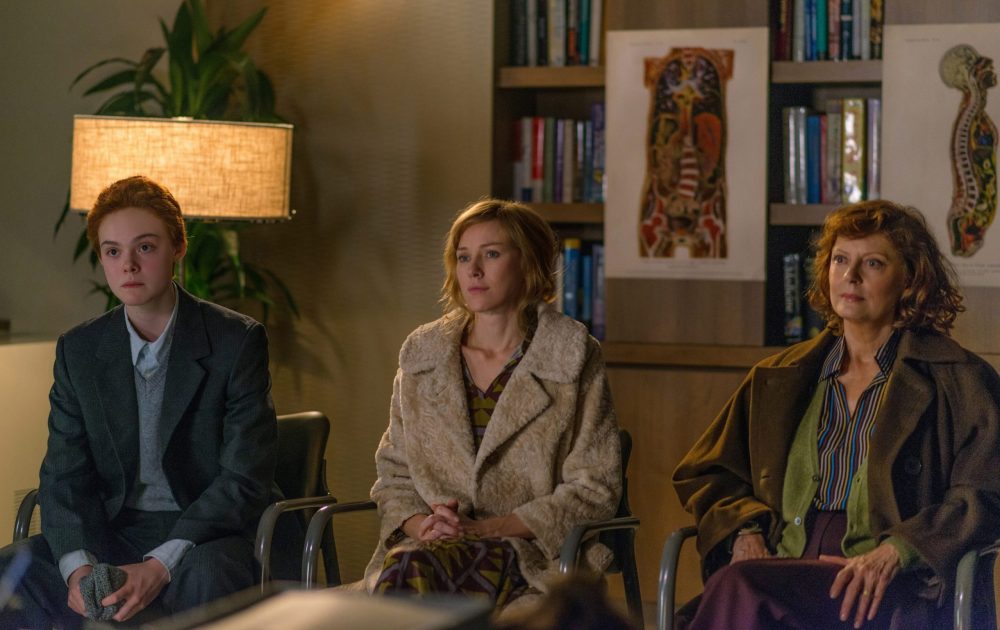Elle Fanning stars as ‘Ray’ in a feature film about transitioning.
3 Generations tells the story, quite literally, of three generations in a matriarchal New York City family who all live under one roof in an eclectic, eccentric artist-activist’s walk-up apartment as they deal with Ray (Elle Fanning), a teenager assigned a female identity at birth. Ray, re-named from Ramona, is desperately hoping to get parental consent so that he can transition. But first, his single mother, Maggie (Naomi Watts), an artist who has some issues and secrets, must track down Ray’s biological father (Tate Donovan) and get his legal consent to allow Ray’s transition. Meanwhile, Maggie’s mom Dolly (Susan Sarandon), Ray’s lesbian-feminist grandmother, tries to get her head around Ray’s identity as something more than a fashionable whim, and must evolve her strongly-held views of what it means to be female, and keep the family together.
Written by Gaby Dellal and Nikole Beckwith, and directed by Dellal, 3 Generations is entertaining, heartwarming, moving, and should be required viewing for those who don’t know what a transgender person looks like or where they come from. The film could also prove cathartic for viewers who have known or loved someone going through the transitioning process; while it’s not a documentary or a reality TV show featuring a real-life transman like Chaz Bono, this mainstream attempt at storytelling is successful in delivering a complex view of one family’s situation.
Elle Fanning, although a cisgender woman, portrays Ray during the period leading up to the beginning of his official gender confirmation and hormone therapy treatment. Fanning gets it across to the audience that Ray does not feel that he is a male trapped in a female’s body. Even though he has not yet transitioned he presents, feels, and acts male. He is male. The film makes clear that his gender confirmation will enable him to be “normal,” not different or changed. The song “Fit In” by KT Tunstall also helps helps build a sense of the Ray’s struggle, which he tries to manage through his own interest in creating electronic music.
One day, and we hope that it’s sooner rather than later, actual transgender actors will claim these roles in Hollywood. Nevertheless, for a film that was made in 2015, 3 Generations is well-intentioned and illuminating, even if the light that is shed is mostly on how cisgender family can better understand and support trans family members. The film received advisement from GLAAD, who is thanked by producers along with New York’s LGBT Center. A recent screening was held in partnership with the New York chapter of PFLAG.
It is refreshing to see a lesbian character with some great lines; not since Lily Tomlin’s performance in Grandma have we seen a character like Dolly, who has the film’s pick of humorous zingers. In one scene she quips, “Having sex with women doesn’t mean you’re open-minded. It just means you’re happy.”
That closed-mindedness that is often assumed of lesbians in relation to trans issues is addressed in the film, as are the reasons for it. Dolly is proud of the three generations of women in her house; it’s a matriarchal/feminist oasis for her, a victory strike against the patriarchy that is all around them. So at first she doesn’t understand why Ray has to transition from Ramona; such a transition would require the erasure of the female. “I still vote lesbian,” she says, as if the subject is up for grabs! “To think I spent my whole life working so women could have control over their bodies and now I have to call my granddaughter ‘he’.”
It’s a true pleasure to see Dolly’s evolution, and her arrival to a place of acceptance and support. It’s also revealing to see Maggie concede that Ray not only has more maturity than she does, but that gender in itself has no value; it’s what you do with it that matters.
